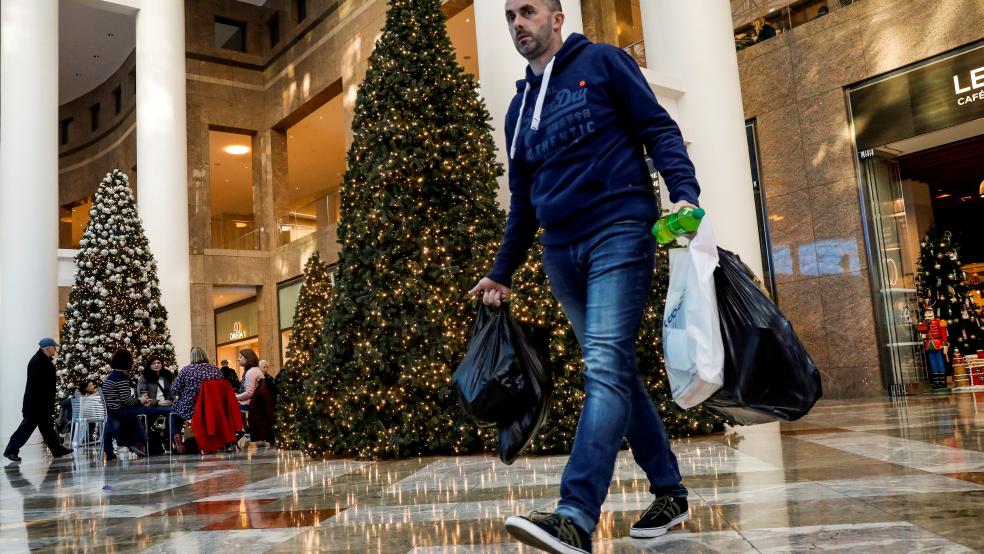The U.S. economy grew at a robust 3.3% annual rate in the final quarter of 2023, according to government data released Thursday, pushing the growth rate for the full calendar year to 2.5%.
The numbers exceeded expectations — experts surveyed by Bloomberg were expecting to see 2.0% growth in the fourth quarter — capping off a year in which the economy consistently outperformed. While growth declined from the 4.9% rate recorded in the third quarter, it remained impressively vigorous as the economy showed no signs of recession amid the Federal Reserve’s aggressive anti-inflation campaign.
Strong consumer demand helped drive the expansion, as personal consumption spending rose by 2.8%. Government spending contributed, as well, with state and local government rising by 3.7% and federal government expenditures increasing by 2.5%.
The fourth-quarter report includes good news on inflation, as well. Consumer prices rose at a 1.7% rate in the final three months of the year, below the Fed’s target of 2%. Core inflation, which ignores volatile food and fuel prices, came in at 2% on the nose. On an annual basis, the consumer price index rose 2.7%, down from 5.9% in 2022. The annual core number was 3.2%, down from 5.1% a year earlier.
Here’s what the experts are saying:
Smashing expectations: "This year has been like Rock ‘Em Sock ‘Em Robots, and the economy is knocking the blocks off the economists, always outperforming," said Dan North, senior economist at Allianz Trade Americas, per CNBC.
A major win: "Stunning and spectacular," said Diane Swonk, chief economist at KPMG, per The New York Times. "We’ll take the win." In a separate note, Swonk said the "economy performed remarkably well in 2023, accelerating on the heels of aggressive rate hikes by the Federal Reserve. Much of that resilience can be attributed to the healing of balance sheets, spurred by the pandemic and the aid that accompanied it and a rebound in productivity growth."
Hitting the Fed’s target: "Goodness, the increase in GDP at the end of last year was meaningfully stronger than I had expected," said Moody’s chief economist Mark Zandi. "Not only did consumers spend and businesses invest more, as anticipated, but unexpectedly trade and inventories added to growth. But despite the robust growth, inflation was tame. … Strong growth and low inflation. Feels very good."
Looks like a soft landing: "To my surprise & delight we have landed softly," said economist Jason Furman. "Risks we veer off the runway into resurgent inflation or recession are real but balanced & not unusually high. Fed deserves a lot of credit ..."
Brian Rose, senior economist at UBS, had a similar take. "It’s hard to imagine how things could look better for the soft landing," he said, per the Times. "Looking back at last year, the combination of growth and inflation that we had was not considered in the realm of possibility by most people. To have such strong growth, low unemployment and to have inflation coming down that quickly, even the optimists weren’t that optimistic."
Better than Goldilocks: "This is not a Goldilocks economy," said economist Paul Krugman. "Goldilocks found a bowl of porridge that was neither too hot nor too cold. We have an economy that is both satisfyingly hot (GDP) and refreshingly cold (inflation). Get this straight, people!"
But tomorrow is another day: Some experts cautioned against forgetting that bad news is always just around the corner, at least potentially. "Most economists have walked back their recession calls, but we’re still not convinced," said Bloomberg economist Eliza Winger. "GDP could slow meaningfully in the first half of 2024 given rapid cooling in the labor market and concerns about credit availability and consumer demand."
Still, most economists seem to accept that they have been too gloomy about the U.S. economy, even if the historical record offered some dire warnings. "This cycle is historically unique; we’ve never had a global pandemic before," said Bank of America’s Michael Gapen. "Maybe the fault was relying too much on history and too much on models."
Economy
Defying Expectations, US Economy Surged at End of 2023

Brendan McDermid



